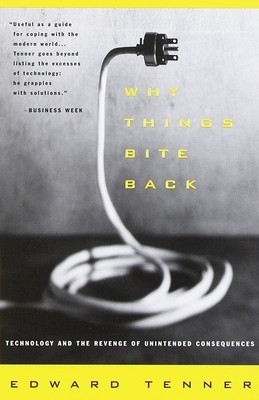
- We will send in 10–14 business days.
- Author: Edward Tenner
- Publisher: VINTAGE
- ISBN-10: 0679747567
- ISBN-13: 9780679747567
- Format: 13.2 x 20.3 x 2.4 cm, minkšti viršeliai
- Language: English
- SAVE -10% with code: EXTRA
Reviews
Description
In this perceptive and provocative look at everything from computer software that requires faster processors and more support staff to antibiotics that breed resistant strains of bacteria, Edward Tenner offers a virtual encyclopedia of what he calls "revenge effects"--the unintended consequences of the mechanical, chemical, biological, and medical forms of ingenuity that have been hallmarks of the progressive, improvement-obsessed modern age. Tenner shows why our confidence in technological solutions may be misplaced, and explores ways in which we can better survive in a world where despite technology's advances--and often because of them--"reality is always gaining on us." For anyone hoping to understand the ways in which society and technology interact, Why Things Bite Back is indispensable reading. "A bracing critique of technological determinism in both its utopian and dystopian forms...No one who wants to think clearly about our high-tech future can afford to ignore this book."--Jackson Lears, Wilson Quarterly
EXTRA 10 % discount with code: EXTRA
The promotion ends in 21d.06:36:03
The discount code is valid when purchasing from 10 €. Discounts do not stack.
- Author: Edward Tenner
- Publisher: VINTAGE
- ISBN-10: 0679747567
- ISBN-13: 9780679747567
- Format: 13.2 x 20.3 x 2.4 cm, minkšti viršeliai
- Language: English English
In this perceptive and provocative look at everything from computer software that requires faster processors and more support staff to antibiotics that breed resistant strains of bacteria, Edward Tenner offers a virtual encyclopedia of what he calls "revenge effects"--the unintended consequences of the mechanical, chemical, biological, and medical forms of ingenuity that have been hallmarks of the progressive, improvement-obsessed modern age. Tenner shows why our confidence in technological solutions may be misplaced, and explores ways in which we can better survive in a world where despite technology's advances--and often because of them--"reality is always gaining on us." For anyone hoping to understand the ways in which society and technology interact, Why Things Bite Back is indispensable reading. "A bracing critique of technological determinism in both its utopian and dystopian forms...No one who wants to think clearly about our high-tech future can afford to ignore this book."--Jackson Lears, Wilson Quarterly


Reviews